Fushoushan Farm (福壽山農場) in Greater Taichung is one of a number of farming areas originally established to provide occupation for demobilized soldiers following the establishment of the Chinese Nationalist Party (KMT) government in Taiwan in the 1950s. Although development as a tourism destination nominally began in 1993, it has been slow, and the area is much less widely known than Cingjing Farm (清境農場) and Wuling Farm (武陵農場), originally established with a similar remit and which have developed into hugely popular destinations for people looking for a summer getaway.
Fushoushan Farm is actively trying to catch up, but has remained much more of an agricultural community. It spreads over 800 hectares ranging in altitude from 2,100m to 2,614m above sea level, and is famous for the quality of its peaches, plums, pears and apples, as well as the sweetness of its cabbages. It was first established by 100 sturdy veterans who the Veterans Affairs Commission (行政院國軍退除役官兵輔導委員會) sent out in 1957 to develop high-mountain agricultural sites. They were given three days’ victuals and sent off into the wilds, and according to a much told story, only discovered this well-watered site just before their supplies ran out.
Until recently, the farm only offered relatively primitive accommodation, but is currently making up for this deficiency with the construction of elegant rooms that feature stunning views and hardwood furnishings.
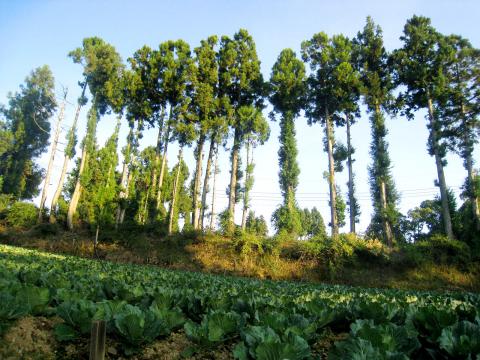
Photo: Ian Bartholomew, Taipei Times
The central buildings of Fushoushan Farm did not promise anything particularly idyllic, looking like a cross between a motel and an agricultural institute. After a strenuous five-hour drive from Taipei, it was distinctly underwhelming. Still, the sweltering summer heat of Taipei and the Lanyang Plain (蘭陽平原) had been left behind as though in another world, and the cool, clean breeze was much welcome.
The farm offers a variety of accommodations that cover a huge range of styles: renovated villas originally servicing visiting officials that have secluded access and gardens (around NT$6,000 a night for two); two-story villas featuring hardwood floors, contemporary furnishings and carefully designed views (around NT$5,000 a night for two); old shipping containers with a roof attached that will house eight people for NT$1,500 per room; and pre-built tent accommodation that sleeps six for NT$1,200 a night. Visitors include everyone from couples out for a romantic getaway to groups of students getting in touch with nature.
I had opted for accommodation in a three-bed wooden hut (NT$2,156 a night) located in the camping area near the scenic Heaven Lake (天池), about a 15-minute drive from the main building. The huts were a step up from the shipping containers, with their own toilet and bath, but are otherwise rather basic. The camping ground is near the top of the farm area, and provides some spectacular views of the night sky and good access to a number of walking trails.
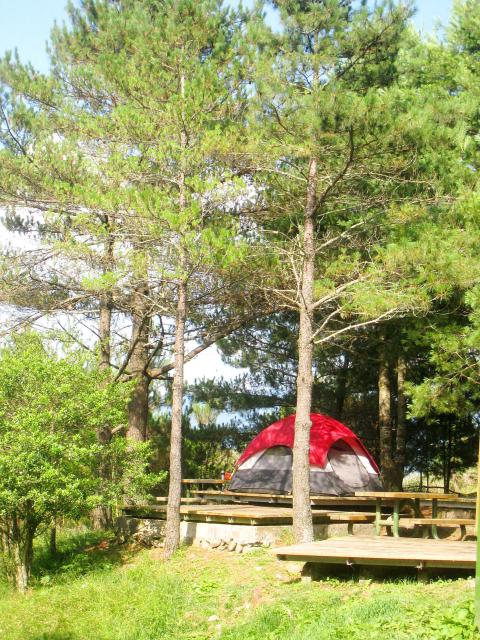
Photo: Ian Bartholomew, Taipei Times
My room was simple though surprisingly comfortable, and came with a TV and an efficient if rather cramped fiberglass bathroom unit. The presence of stray dogs, though remarkably healthy and friendly for the most part, might prove annoying to some. A central building with vending machines and offices is being constructed to provide better management of the camping area.
Fushoushan caters primarily to those looking for a relatively relaxed experience of nature rather than hardcore campers or trekkers. Nevertheless, the Forest Bath Trail (森林浴步道), which is just over 7km long, offers something of a challenge. (Take care: This trail can be slippery, and rising afternoon mists can make it dangerous.) Most other trails are intended for leisurely strolling and viewing the scenery. The mountains are remarkably beautiful, and the sunsets are famous for their magnificent chromatic effects.
Food is an important part of the Fushoushan experience, with many people visiting specifically to purchase freshly picked seasonable fruit. Fushoushan is now approaching the end of its peach season, and next month, a new wave of visitors is expected for the early sweet apples (蜜蘋果) that the farm is particularly renowned for.
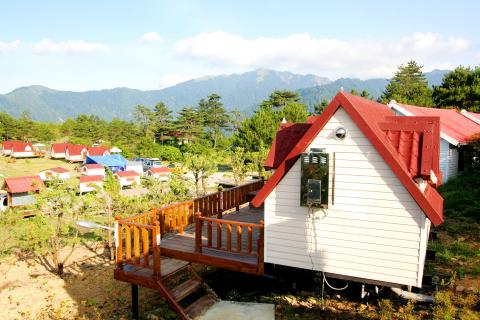
Photo: Ian Bartholomew, Taipei Times
According to one member of staff at the Fushoushan produce outlet, nothing beats the experience of eating fruit prior to the inevitable battering it gets in the shipment process down the mountain. Peaches regularly sell out each day. Rumors that peaches sold by independent vendors and roadside stalls in popular tourism destinations such as Lalashan (拉拉山) were in fact imported from the US have made some visitors wary. Fushoushan Farm, which is still under the management of the Veterans Affairs Commission, provides a fixed price and a guarantee of quality.
While many of those camping out brought their own meals, there is a restaurant providing reasonably priced meals that attempt to showcase local produce. The food is generally quite good, but it is not very imaginative; the menu heavily favors larger parties and the selection of smaller dishes suitable for two is limited. Unfortunately, the village of Lishan (梨山), about a 15-minute drive away, does not seem to offer any outstanding dining options either.
Fushoushan Farm still has many limitations as a tourism destination, and clearly its title of “Taiwan’s little Switzerland” (台灣小瑞士) applies only to the mountain views. But these and the sense of being high up in the mountains in relative comfort are sufficient to make the journey worthwhile.
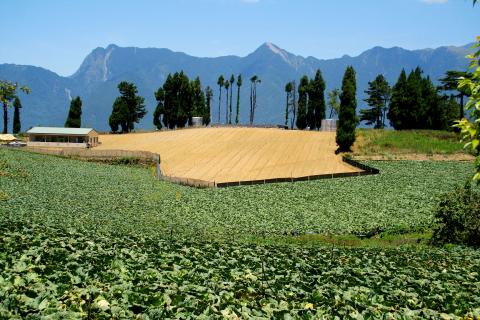
Photo: Ian Bartholomew, Taipei Times
It is worth mentioning that Fushoushan Farm also has special discounts for long stays, starting at NT$6,000 for a week, per person, to NT$18,000 for a month, per person, including three meals a day. There can be no more exhilarating (or indeed cheaper way) of beating the summer heat.
If you go
Fushoushan Farm is located at 29 Fushou Rd, Lishan Borough, Heping Dist, Greater Taichung (台中市和平區梨山里福壽路29號). The visitor center can be contacted at (04) 2598-9202, or call the toll-free service number 0800-073-999. Detailed information about the farm, including room rate schedules and directions, in Chinese, English and Japanese, are available at www.fushoushan.com.tw
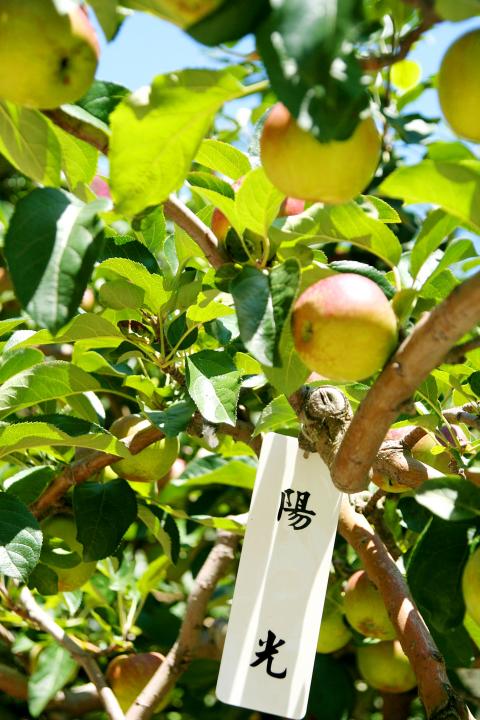
Photo: Ian Bartholomew, Taipei Times

April 14 to April 20 In March 1947, Sising Katadrepan urged the government to drop the “high mountain people” (高山族) designation for Indigenous Taiwanese and refer to them as “Taiwan people” (台灣族). He considered the term derogatory, arguing that it made them sound like animals. The Taiwan Provincial Government agreed to stop using the term, stating that Indigenous Taiwanese suffered all sorts of discrimination and oppression under the Japanese and were forced to live in the mountains as outsiders to society. Now, under the new regime, they would be seen as equals, thus they should be henceforth

Last week, the the National Immigration Agency (NIA) told the legislature that more than 10,000 naturalized Taiwanese citizens from the People’s Republic of China (PRC) risked having their citizenship revoked if they failed to provide proof that they had renounced their Chinese household registration within the next three months. Renunciation is required under the Act Governing Relations Between the People of the Taiwan Area and the Mainland Area (臺灣地區與大陸地區人民關係條例), as amended in 2004, though it was only a legal requirement after 2000. Prior to that, it had been only an administrative requirement since the Nationality Act (國籍法) was established in

With over 100 works on display, this is Louise Bourgeois’ first solo show in Taiwan. Visitors are invited to traverse her world of love and hate, vengeance and acceptance, trauma and reconciliation. Dominating the entrance, the nine-foot-tall Crouching Spider (2003) greets visitors. The creature looms behind the glass facade, symbolic protector and gatekeeper to the intimate journey ahead. Bourgeois, best known for her giant spider sculptures, is one of the most influential artist of the twentieth century. Blending vulnerability and defiance through themes of sexuality, trauma and identity, her work reshaped the landscape of contemporary art with fearless honesty. “People are influenced by

The remains of this Japanese-era trail designed to protect the camphor industry make for a scenic day-hike, a fascinating overnight hike or a challenging multi-day adventure Maolin District (茂林) in Kaohsiung is well known for beautiful roadside scenery, waterfalls, the annual butterfly migration and indigenous culture. A lesser known but worthwhile destination here lies along the very top of the valley: the Liugui Security Path (六龜警備道). This relic of the Japanese era once isolated the Maolin valley from the outside world but now serves to draw tourists in. The path originally ran for about 50km, but not all of this trail is still easily walkable. The nicest section for a simple day hike is the heavily trafficked southern section above Maolin and Wanshan (萬山) villages. Remains of